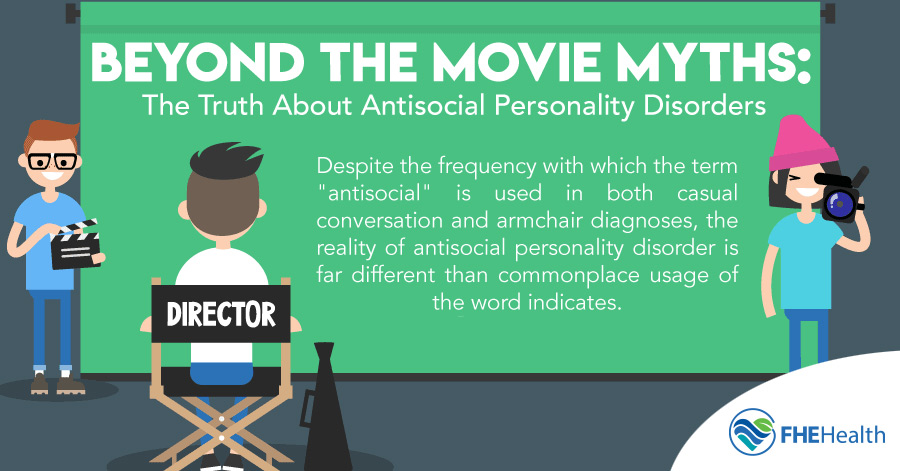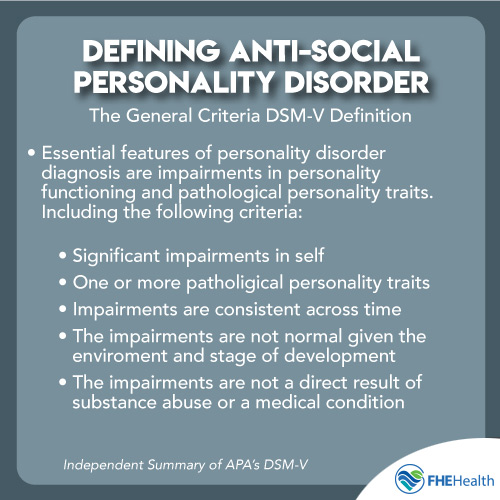
Despite the frequency with which the term “antisocial” is used in both casual conversation and armchair diagnoses, the reality of antisocial personality disorder is far different than commonplace usage of the word indicates. A personality disorder that often manifests as a general disregard for the thoughts, feelings and emotions of other people, antisocial personality disorder can also be colloquially known as sociopathy and is occasionally confused with psychopathy.
While a proper diagnosis is required for effective treatment, whether as a standalone treatment or as part of dual diagnosis in conjunction with other conditions like a substance use disorder, the misconceptions in the media do not make this process easy. The common myths about antisocial personality disorder can be damaging to the understanding of this condition as well as the opportunity for appropriate rehabilitation.
What Is Antisocial Personality Disorder?
 Antisocial personality disorder, also known as ASPD, is a condition in which normal human empathy and ethics are lacking. Officially recognized by the Diagnostic and Statistical Manual of Mental Disorders (DSM-5), ASPD is clinically characterized by the following traits in a person age 18 or older:
Antisocial personality disorder, also known as ASPD, is a condition in which normal human empathy and ethics are lacking. Officially recognized by the Diagnostic and Statistical Manual of Mental Disorders (DSM-5), ASPD is clinically characterized by the following traits in a person age 18 or older:
- A failure to conform to social norms regarding lawful behavior
- Deceitfulness, including lying, use of aliases or otherwise conning other people for pleasure or profit
- Failure to plan ahead or impulsive behavior
- Disregard for personal safety and the safety of others
- Irresponsibility, including the inability to sustain regular work or maintain financial obligations
- A lack of remorse for actions
- Personality traits that include manipulation, deceitfulness, callousness, hostility, and impulsiveness
- Impairments in self-functioning and interpersonal functioning
Although the perception is that this condition is exceedingly rare, that isn’t necessarily true. Lifetime prevalence for men is around 2 to 4 percent of the population and around 0.5 to 1 percent for women. Prevalence is at its height in those 24 to 44 years old, with a decline in middle age, and varies by population but can include up to 80 percent of those in correctional facilities. ASPD is frequently one element of a dual diagnosis, with common crossovers including bipolar disorder, major depressive disorder and substance use disorders. Those with ASPD are at a heightened risk for accidents, suicide, HIV, hepatitis C and traumatic injuries. Unfortunately, ASPD has also been noted as a predictor of poor treatment response.
The Glamorization of Sociopathy
 Antisocial personality disorder is a very real condition that affects millions of adults in the United States. However, despite the challenges it can cause in those affected, the state of being identified (or self-identified) as a sociopath is not depicted well in the media. Take, for example, Sherlock’s character in the eponymous BBC show. Wildly bright and intuitive while still being callous, cold, rude and unafraid to violate social norms, Sherlock refers to himself as a “high-functioning sociopath,” which seemingly is accepted as a good thing. While unlikeable to many members of law enforcement as well as his acquaintances, Sherlock’s character is highly lauded by the show’s fans.
Antisocial personality disorder is a very real condition that affects millions of adults in the United States. However, despite the challenges it can cause in those affected, the state of being identified (or self-identified) as a sociopath is not depicted well in the media. Take, for example, Sherlock’s character in the eponymous BBC show. Wildly bright and intuitive while still being callous, cold, rude and unafraid to violate social norms, Sherlock refers to himself as a “high-functioning sociopath,” which seemingly is accepted as a good thing. While unlikeable to many members of law enforcement as well as his acquaintances, Sherlock’s character is highly lauded by the show’s fans.
Similar films, like American Psycho and Silence of the Lambs, play on some of the same tropes, with the protagonist or antagonist showing brilliance, social expertise and wealth. In many ways, this glamorizes antisocial personality disorder, depicting affected individuals as something almost mythical and enviable.
Some researchers believe that this stereotype of the “elite psychopath” is damaging, as it fails to represent an accurate picture of an ASPD diagnosis. Realistic media portrayals are few and far between, creating confusion and misguided opinions as to the nature of true antisocial personality disorder. This can stand in the way of seeking effective treatment, particularly if individuals are unaware of their symptoms or otherwise misunderstand the reality of ASPD.
Reality vs. Dramatic Representations

Antisocial personality disorder is fairly clear-cut in terms of diagnostic indicators. However, this disorder is frequently misrepresented or confused with other similar personality disorders in the media and in dramatic depictions, muddying the waters and making true diagnosis more challenging. These common myths are often believed in relation to ASPD.
ASPD Is Untreatable
An antisocial personality disorder is often painted as an unstoppable condition in which those affected enjoy the side effects of the disorder, lean into sociopathic tendencies, so to speak, and are hopeless in treatment. However, this is not actually the case. Some medications have been demonstrated to reduce aggressive tendencies, and some forms of psychotherapy can effectively address the underlying complications of antisocial personality disorder. More study is needed to determine a comprehensive form of treatment, but on the whole, ASPD can be addressed.
ASPD Is the Same Thing as Being a Psychopath
ASPD is regularly seen as synonymous with being a psychopath or sociopath, but as these terms do not have any clinical definition, the association is largely worthless. Colloquially, a psychopath is one who suffers from violent or abnormal social behavior, a definition that does not necessarily extend to someone with clinically diagnosed ASPD. On a sliding scale, psychopathy is considered a more extreme form of behavioral disorder, although there are crossovers in the commonly accepted symptoms.
ASPD Is an Excuse for Poor Behavior
Due to the crossovers between antisocial personality disorder traits and criminal behavior, some people believe that ASPD is an excuse for poor behavior and that those who commit crimes and have ASPD use their diagnosis as an excuse or a crutch. In reality, this is rarely true. Many people who have ASPD and engage in criminal activities are undiagnosed or do not realize the correlation. While ASPD can indeed result in time spent behind bars, it is not generally used as an excuse or a way to avoid prosecution.
Seeking Treatment
Untreated ASPD can be a detriment to addressing other challenges like co-occurring mental health disorders as well as addiction. With the propensity toward lawless behavior and a disregard for societal rules, it’s not uncommon for those with an antisocial personality disorder to engage in reckless or criminal behavior, including drug addiction or distribution. For this reason, many individuals with ASPD suffer from substance use disorders, with 78 percent of ASPD adults falling victim to addiction or a substance-related disorder.
Seeking treatment is an important part of adequately managing all forms of personality and behavioral disorders, providing tools and coping techniques that can support a healthier approach to life. Addressing personality disorders can improve the likelihood of treating associated conditions, like other mental health issues and addiction to drugs or alcohol.
If you or someone you love is living with an antisocial personality disorder or a dual diagnosis involving ASPD, FHE Health can help. Please contact us today to learn more about our mental health and addiction rehabilitation programs.






